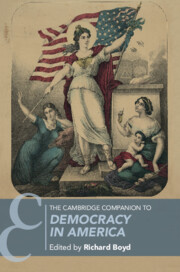Book contents
- The Cambridge Companion to Democracy in America
- Series page
- The Cambridge Companion to Democracy in America
- Copyright page
- Contents
- Contributors
- Acknowledgments
- Chronology
- Abbreviations of Tocqueville’s Major Works
- Introduction
- Part I Sources and Contexts
- Part II Receptions and Applications
- Part III Genres and Themes
- 9 “Ideas for the Intellect and Emotions for the Heart”
- 10 Tocquevillean Association and the Market
- 11 Tocqueville on the Federal Constitution
- 12 Religion in Democracy in America
- 13 Tocqueville’s Puritans
- Part IV Democracy’s Enduring Challenges
- References
- Index
- Series page
13 - Tocqueville’s Puritans
from Part III - Genres and Themes
Published online by Cambridge University Press: 23 March 2022
- The Cambridge Companion to Democracy in America
- Series page
- The Cambridge Companion to Democracy in America
- Copyright page
- Contents
- Contributors
- Acknowledgments
- Chronology
- Abbreviations of Tocqueville’s Major Works
- Introduction
- Part I Sources and Contexts
- Part II Receptions and Applications
- Part III Genres and Themes
- 9 “Ideas for the Intellect and Emotions for the Heart”
- 10 Tocquevillean Association and the Market
- 11 Tocqueville on the Federal Constitution
- 12 Religion in Democracy in America
- 13 Tocqueville’s Puritans
- Part IV Democracy’s Enduring Challenges
- References
- Index
- Series page
Summary
Democracy in America begins from the central insight that religion precedes politics. This is best seen in the prominent role that Tocqueville accords to America’s Puritan Founders. The Puritans, in his view, contribute much to the spirit of American political culture. On the one hand, they contribute a covenantal theology that focuses on the importance of intermediation among otherwise separate democratic individuals. Yet the Puritans are also responsible for notions of sinfulness and religious “stain” that have the potential to assume illiberal forms. As Joshua Mitchell argues in this chapter, one potentially illiberal danger of Puritanism is the scapegoating of particular groups through the dynamics of identity politics. In Mitchell’s view, we need to reckon with America’s Puritan legacy not only through the lens of John Calvin and the covenantal theory of mediation but also through the prism of Blaise Pascal whose insights into the problems of loneliness, separation, and redemption illuminate contemporary political dilemmas.
Keywords
- Type
- Chapter
- Information
- The Cambridge Companion to Democracy in America , pp. 347 - 366Publisher: Cambridge University PressPrint publication year: 2022

